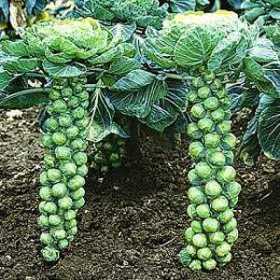How to Grow Brussels Sprouts – A Guide to Growing Brussels Sprouts Brassica Oleracea
 Brussels Sprouts
Brussels Sprouts
Brussels Sprouts were a popular vegetable in Belgium, hence the name. They are delicious if grown and cooked correctly – see Brussels sprouts recipes and are an excellent source of vitamins C, K, B12, folate along with dietary fibre. They also contain glucosinolates and antioxidants – compounds which may help to prevent cancer.
Brussels Sprouts are a member of the brassica family so club root may be a problem if you have it on your plot.
They are a slow growing vegetable, and take 26 to 31 weeks to reach maturity. They can be picked fresh from September until February.
Varieties of Brussels Sprouts
For something different on both plot and plate, why not try growing some red Brussels sprouts? They’re certainly different looking and they do taste well.
- Red Delicious is a late season sprout with tightly packed, red buttons that are ready in December but will hold until March. They retain their colour when cooked.
- Falstaff Is a novelty purple-red sprout that matures over a long period. It has a milder, nuttier flavour than standard green types. Buttons can be harvested from October onwards but the colour develops in intensity after a hard frost. The colour is retained during cooking. It has the RHS Award of Garden
- Wellington is an F1 Hybrid crops heavy from December through March.
- Nelson is a great early maturing variety , September through – December, that produces lots of even sized dark coloured, sweet tasting buttons .
- Trafalgar is a modern hybrid that has a superb flavour that sets it apart from other varieties. It produces a heavy crop of medium sized, firm button sprouts that retain their excellent quality over a long period of time from mid-December to late March.
Brussels Sprouts Pests & Problems
- Brussels sprouts can be troubled by the clubroot fungus causing swollen and distorted roots and stunted growth.
- If cabbage root fly is a problem on your site you can use brassica collars to keep the fly away until the plants are established.
- Wind rock and lack of nutrients is the most common cause of “blown” sprouts. The buttons become loose rather than tight and firm . Removing the blown sprouts and giving some additional feeding with a high nitrogen liquid fertiliser may stop the problem.
- Brassica White Fly (which is in fact a small moth) is a frequent pest on sprouts on allotments and gardens but is not a serious problem. It can be reduced by washing with a jet of water or insecticidal soap which contains fatty acids that block the breathing holes of the moth .
- Cabbage white butterflies can cause a lot of damage to sprouts. Insect netting is the best way to keep these caterpillars away.
Cultivating Brussels Sprouts
Start off in March and April and plant out around May and June in their final position. Allow plenty of space for them, most full sized varieties require 75cm between plants . They like a rich soil with plenty of nitrogen to grow their extensive leaf area.
Prepare a bed for them as given in Preparing the Ideal Brassica Bed and as they will be in the ground long time and grow into such large fleshy leaved plants, they really need some extra feed during August or September to produce a good crop . A couple of teaspoonful’s (10ml) of dried blood or one of sulphate of ammonia sprinkled around the base of the plant would be ideal .
Culinary Uses of Brussels Sprouts
A good way to cook sprouts is to clean and remove any loose outer leaves. Drop them into water at a rolling boil for just two or three minute. Remove and drain well, then gently fry in butter with plenty of black pepper for a few minutes. This is a really tasty alternative to the usual boiled or steamed version.
Gluts of sprouts can be frozen. Blanch them for two or three minutes before freezing and reduce the cooking time by a quarter when you use them. Brussels tops can be used as a vegetable after the sprouts have been used but removing it before then will stop the development of the buttons. Some say it is the most delicious of the green leafy brassicas.




